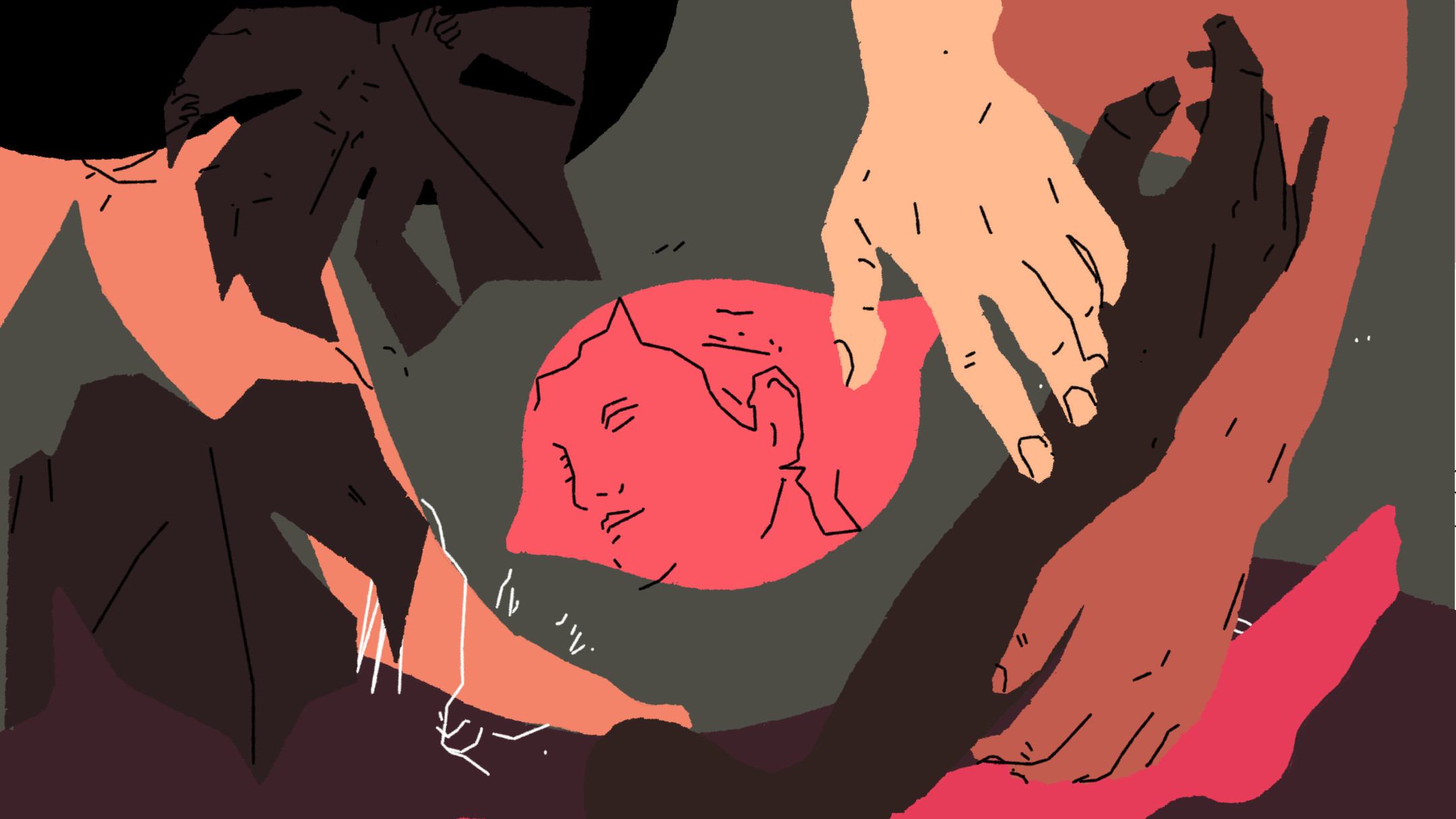It is difficult to talk about sex without talking aboutsex.
A solo or partnered act, sex contains different narratives—and often baggage. Sex is reproduction and family planning. Sex is with one partner or several. Sexual self-pleasure, well that, too, is not without navigation. Pop culture alters our idea of sex as a performance. Institutions and governments have made rules about sex, making the personal very political. I’m barely scratching the surface of how and why we think about sex the way we do. Even in a progressive era, while a beautiful and natural act, sex is still positioned as complex and divisive.
However, there is a brand seeking to shift thought and practice of sex to a biological and physical wellness norm:maude.
莫德is unique. The direct-to-consumer wellness company wishes to live in a world where personal massagers are bought in relative harmony and normalcy alongside other wellness products found in a drugstore. Éva Goicochea, maude’s founder and CEO, says of herself, “I'm not a sex therapist or a doctor. I don't want to be prescriptive.” Rather, she says, the brand’s goal is to get people to understand the holistic nature of wellness, which is the industry umbrella maude fits under. People pour money and resources into wellness practices around diet, physical fitness, and skincare. Yet, there is still an omission in the mainstream of accepted sexual wellness practices and products that positively impact mental and physical health in similar ways.
莫德is not, simply because it is founded and run by a woman, a feminist sexual wellness brand exclusively for women. It is inclusive of all people and their sexual wellness needs. The business reality is that the sexualhealth and wellness industriesare incredibly lucrative and important to an expansive demographic of buyers. By 2026, theglobal sexual health industry is expected to reach $125 billion UDS, according to Businesswire. Because maude, too, snuggles into wellness, that industry’s profitby 2025 will reach approximately $6 trillion USD worldwide, according to Statista.
Goicochea’s strategy for maude and bringing in customers is rooted in talking to them like the people that they are. “These products are part of your everyday [life] and they can be treated that way,” she tells me on a video call from her New York office.
The brand’s team is optimistic about presenting foundational knowledge that builds into more normalcy around sex. “We are getting back to this place that is biologically factual. We talk about things in a biologically factual way that demonstrates the world that we want to live in. It’s not about tackling all of these subjects head-on and trying to teach people about them or change minds through talking at them. It is just showing them.”
Éva’s path to maude
Goicochea is thoughtful and open about her journey to founding maude but ensures her story does not eclipse the brand’s overall goals, making her the face of it. She’s at a particular crossroad as a founder and entrepreneur: running a business today usually means self-branding is almost as essential as company branding. “We're going to continue to get called a female brand because I'm a woman, which is in some ways why we try to hide me,” she says laughing, “Of course I do interviews. People know I exist and I'm the founder. But my face isn't all over everything because I don't want it to be. I'm not the face of the brand. I don't want people to feel excluded.”
Her path to this brand is rooted in doing work that is meaningfulandbeneficial to the public. Before maude would become the seed of an idea, Goicochea, a sixth-generation New Mexican raised in California, bounced between New York and Los Angeles professionally, working early on in her career as a legislative aide in healthcare at the California Medical Association. She studied marketing in college, eventually moving on from the healthcare world to go back to brand and ecommerce strategy for companies like Everlane, The Natural Resources Defense Council, and Josie Maran, to name a few. Maude isn’t Goicochea’s first entrepreneurial venture: in 2015, she went on to launch Tinker Watches with her husband, Ian, and the designer Luke Ragno.
Still, around the same time, Goicochea was interested in bringing together all the parts of her professional life, whether that role and company existed or not.“我试图与公众头脑的桥梁lth piece. At the time, wellness was a thing. The companies I wanted to work for didn't exist. In conversation with some people, sexual wellness got brought up and they were like, ‘we should create a cool company around this.’ I marinated on the idea, thinking, ‘wait a second, this is the idea and does it exist? And can I go work for that company?’ And it didn't.”
莫德launched in 2018. In the summer of 2020, during what would be the brand’s best year, Goicochea raised $2.2 million dollars in venture capital funding (bringing her total to $4.3M), becoming one of 60 LatinX women to raise over $1 million dollars.
莫德is a play on one of Goicochea’s favorite words: modern. (We’ll get to howmaudernworks in the maude world later.) “Modern means strength. We were sort of taking on the big guys in the industry. Also, I like the fact that莫德was a TV show that was really progressive in terms of reproductive rights and women's rights. The name just ticked all the boxes.”
In late 2020, maude announced thatthe actress Dakota Johnson would become co-creative director, focusing on product development and sustainability. Johnson, like Goicochea, prefers much less attention and is not considered the face of the brand either.This trend is not new: actors and celebrities do have financial or creative roles in brands but stay relatively behind the scenes. Johnson approached the brand, not the other way around, Goicochea says. “She came on as a co-creative director to lead more products in general because she loves coming up with them. It was more about her coming aboard to give a bigger presence to the brand but also keep thinking through the question: how can we keep innovating? How can we create products that take care of you? And she’s really thoughtful that way.”
Back to basics
It’s important to understand first how and why product and tone decisions were made at maude.
In our initial correspondence for this interview, Goicochea mentioned the Comstock Laws to me. America, just before and at the turn of the 20th century, was having a crisis of conscience. In the late 1800s, a set of federally mandated laws to be known as theComstock Laws restricted or repressed articles deemed as immoral or obscene.It included contraceptives, sex toys, personal letters in reference to sexual content, medicines, pamphlets, and so much more. In essence, anything to do with sex not in a family planning sense was deemed vile or filthy. Soon after, 24 states adopted this federal act with similar versions limiting or restricting materials and products.
Yet, in the same era, running alongside obscenity laws, sexual health was initially considered part of wellness. Take, for instance, the vibrator. It was a tool used all over the body, and not as modern misogynistic myth has assumed as a way to treat ahysterical woman.书中从1906年开始,根据石英,doctor named Samuel Spencer Wallianused vibrators to treat organs all over the body: kidneys, lungs, skin. Think of theMagic Wandas a modern example: it’s a tool branded as a neck massager but has been used for other sexually related purposes as well.

Goicochea subscribes to the thought that such tools as a vibrator have benefits for wellness overall, as they were initially intended. Moving past different layers of history to get back to that point is more complicated. Even working through outdated laws on so-called filth or obscenity, maude isn’t in the same realm as other sexual products. Pornographic and sex toy industries have upended the ways in which the public views sex. “When you look at the way the category has been marketed, and the products, it's all about performance, being sexy and hypersexual,” she says.
In an interview withVanity Fairlast year, Goicochea noted that sexual wellness, and sex itself, perhaps feels like a chore to some folks. “It has to become a practice,” she told the publication. I asked her to expand on that thought, wondering what elements make sex and sexual wellness a chore to people, and she noted that the hypersexualization aspect didn’t help. Like a lot of media focused on performance, hypersexualized narratives and visuals can easily set someone up to fail by assuming bodies must look or perform in a certain way. Bodiesaredifferent, and all worthy, and only recently has that narrative permeated mainstream culture.
Inclusivity isn’t a trend. It is meant to break away from a homogenous view of people. With regard to sex, an expanded language and consideration around LGBTQ+ folks, racial diversity, and feminist-leaning films and art has meant pleasure isn’t so hollow or narrowly through the lens of cis-male executives. Still, some biological elements get left behind.
“Something that is so common, basic and needed, and healthy... I think that’s why people have probably perceived it as a chore. The pressure around the conversation makes it harder [to have.]”
Taking all of these angles into consideration, maude, as Goicochea emphasizes, literally got back to basics when it began product ideation. The brand launched with four products: the Vibe (a personal massager), two lubricants, and condoms. These products serve as the foundation of maude and a jumping-off point for which more products can exist within the brand’s ecosystem.
These products were intentionally chosen to bring sexual health and wellness together. Some of maude’s investors felt otherwise about what the brand needed. “The pushback I was getting from investors was like, ‘hey, you really need one hero product.’ My point was actually if we came out with one hero product, we're just perpetuating the fractured market—we're just continuing to create a divide. That divide is like sex toys and devices can be found in a seedy strip mall and condoms and lubricants can be found at a drugstore,” she says.
Name brands synonymous with condoms have other products, too, and the same goes for lubricant brands, but they are often found in the drugstore, available to anyone. Nobody owns all of them together, Goicochea says, which is the solution maude is striving for.
“If these products are not sold and marketed together as basics, we're always going to be overcoming the preconceived notion that one is more important than the other or that one is more mainstream than the other. And that's not it, especially when it comes to the Vibe. It absolutely needs to be considered a tool and a basic for people. You should find it where these other things are.”
Today, maude’s product line has expanded to include a massage candle that comes both in scented and unscented, multi-use body and massage oil, a pH balanced wash, hydrating bath milk, mineral bath salts, and hypoallergenic compostable compressed towels. Last month, maudereleased the smaller, more versatile of its vibes called Drop, a small egg shaped personal massager. All of these products serve a distinct purpose, Goicochea tells me, and are thoughtfully made for any individual to use near daily by themselves or with partners.
莫德is also trying to market intimacy, broadly speaking, beyond the act of sex, which includes the candles and body care products, and potentially more suited to that. “When we started introducing new products that were meant for mood and intimacy—which is really what the customers are asking for—it changed everything,” she says, “And it was the right time because I think now we're starting to consider it a part of beauty and wellness.” Earlier this year, the brandpartnered with Urban Outfitters to sell the Vibe, but it fell under the tech category. Other items fall under beauty or wellness. Carving out a new lane to run through existing ones isn’t without its challenges.
Wellness is maude’s wheelhouse, even if, as a wider concept, the term is a的矛盾来源.Yet, the brand gives evidence its intent is to amplify and prioritize care. This is perhaps what makes maude a thoroughly modern company: one that has baked in evolution and change from its foundation by building on top of basics, not simply adjusting with anything that becomes fashionable.
“Health becomes synonymous with physical health, whereas wellness feels like it can encapsulate both physical and mental health,” Goicochea says, continuing that the term feels overused and superficial at times. “It’s not really driving the fact that wellness includes your mental health and your emotional health.
“I don't know what the right word is. We have the same inner turmoil with the term toy. We don't want to call it sex toys. We want to call them devices but device also sound clinical and a little scary. The language is important, but also it feels like it's evolving.”
Sexual wellness and intimacy for all people
莫德is and isn’t a pandemic story. There is an evergreen spirit to the brand but the immediacy of interrogating what the self needs—and with whom—and what products align with that was felt the most during a lost year in a global pandemic.
The brand was so hotly tapped in 2020, Goicochea says, they couldn’t keep up with demand. “We've been out of product for almost a year. We have never been fully stocked with every product. So, that's been its own challenge.” The brand grew 50% quarter over quarter, she says, crediting her small but mighty team weathering all the challenges. “We need to be flexible around what we have and don't have. We watch patterns of behavior around traffic. It used to be at night and now it's in the middle of the day. You're seeing what people are clicking on and reading. This year cemented our perspective on who our customer is and what they needed because we were able to see these patterns emerge.”
莫德’s customer demographic is neatly split three ways: 25% of customers are aged 18 to 25, and 25% of customers are over the age of 45, with the remaining 50% covering the rest. Goicochea is concerned with making maude inclusive for absolutely everyone. If you notice, she says, people are omitted from product images and promotion. That’s a deliberate choice so the product speaks to a person and their need, not a brand concept of a buyer. Goicochea once told Vanity Fair, “For me, it made no sense that this industry was gendered because you have sex with a partner, whoever that partner is; or partners; or yourself.”
一个人口Goicochea确实很热情about tending to is middle-aged and above. “One thing that we don't talk about, but it feels like we're starting to, especially in the past couple of years, is growing older and the changes that happen to you. What happens hormonally and what are the physical and mental health implications around those changes in terms of your relationship with other people and how much you want to have sex or not,” she offers. Sex has such a youth tendency like almost anything else in the world that the thought of people in their 50s and older having andenjoyingsex is in itself almost (and stupidly) not permitted in conversation.
Here, buyers can look to resources on such topics approached compassionately and factually on maude’s popular content arm,The Maudern.It looks quite a lot like a Tumblr page with black and white photos of romantic encounters, Classical art, and figures in history, all gathered together for readers to peruse. And peruse they do! The Maudern gets nearly one million views per month. The site offers insights on relationships, culture, art, science, and history—answering questions aboutfantasies for brain health,why we lean right when we kiss, andsex lives post-pandemic.It also has sections calledThe EssentialsandThe Golden,后者提供了方便的反对tent on sex and relationships for people who are middle-aged and up. It does feel remarkable to speak to buyers of that demographic so plainly and easily about sex without aging them into a category or definition. “I would say that by singling people out, you're overlooking the universal needs that people have,” Goicochea says, ”And so we thought, ‘what are the psychographic connections that our customers have? What are their values? What do they need? How do they need to be spoken to? And often that crosses gender and age. You might find somebody that feels the same way and they're in their 60s or 70s to somebody in their 20s.”
There is a deeply rooted empathy in how maude’s team markets and speaks to customers. Sexual wellness is one realm that demands such honest care. It’s not the fault of the act or the people doing it that sex has such a knotted history. But with time and a more modern understanding, perhaps we will keep leaning toward a world where we discuss sexual wellness with the same openness we use when discussing how to tend to the pores on our face. That sexual wellness tools will be as accessible as condoms in a drugstore without the baggage of it being taboo.






